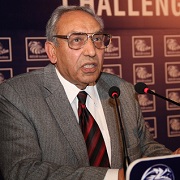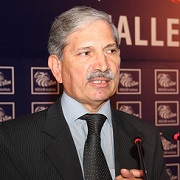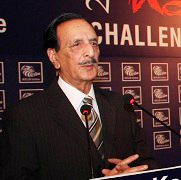FOURTH SESSION: Report of 2 Day International Conference on Kashmir: Challenges & Prospects
|
A two-day international conference on “Kashmir: Challenges and Prospects”, organized by the think tank MUSLIM Institute, was held at the Islamabad Club Islamabad on Wednesday & Thursday 26 & 27 March 2014. The conference was addressed by numerous Pakistani and international luminaries and experts on issues of global politics and international relations.
The report of fourth session, among five different sessions of the conference, is given below.
|
|
|
The solving way to Kashmir issue
Dr. Sun Hongqi
Director & Prof. Pakistan Research Center. Intl. Study Center Jiangsu Province, China
|
  |
It is more than 60 years since Kashmir issue appeared and until now it has not yet been resolved. Since independence, three wars have already happened between Pakistan and India; two of them were caused directly by Kashmir Issue. It not only cause disadvantages to Pakistan and India, but also has a negative effect on peace and stability in the region.
Disputes between Pakistan and India have consumed precious resources that could have been used for progress and prosperity. As to future solution of the Kashmir issue, the only option is reconciliation. However, it would be unrealistic to expect overnight settlement of such a historical dispute. Pakistan and India should enhance cooperation, exchanges, interaction and move towards settlement of disputes. Other countries in South Asia and international community should do more to persuade Pakistan and India to talk each other and work for reconciliation.
China is one of the three countries which share the border with Kashmir and its role on Kashmir issue is at least as follows:- firstly to try its efforts to promote peace talks. Secondly to encourage, assist and support any positive efforts by the third-party and international community. Thirdly to give substantial assistance to local people in Kashmir, such as providing disaster relief, improving livelihood there, increasing the basic facilities and infrastructures, and so on. China has will and the capability to do so.
UN resolutions, including national-self-determination, as well as the third- party interference which can be accepted by Pakistan and India, should be recognized as the part of assistance by international community. It must be emphasized that, before the solution on Kashmir issue maintaining peace and stability in the Kashmir region, improving local people's livelihood and respecting their human rights and democratic wishes, should be the unavoidable responsibility and obligation of relevant parties.
|
|
Video Link Address
Mirwaiz Umer Farooq
Leader All Parties Hurriyat Conference, Indian Held Kashmir
|
  |
I welcome the initiative of MUSLIM Institute to organize today’s event. Kashmir dispute is not a territorial dispute but an issue linked with the future of more than fourteen million people living in the region. International community should see Kashmir issue in the context of commitment that world bodies have made to provide them right of self-determination. Unfortunately sixty five years have gone but Kashmiri people have yet not been given their fundamental right of self-determination. Issue of Kashmir is political in nature and unless and until the political initiative is taken by international community and UN, there can be no peace and prosperity in Kashmir and at large in the entire South Asia. All Parties Hurriyat Conference maintains that right of self-determination to the people of Kashmir is non-negotiable.
Innocents are being killed in Kashmir; violations of the worst kind have been perpetuated by India, the biggest claimer of democracy. Govt. of India is trying to muffle the voice of people for their basic rights by using force, intimidation and terror. Kashmir remains world’s highest militarized zone. More than eighty thousand people have lost their lives in last twenty years. We have more than nine thousand disappeared people and six thousand and five hundred unmarked graves. There is no accountability as far state of India is concerned. The black laws especially AFSPA and other laws that give authority to Indian forces with impunity, have inflicted tremendous loss of life in Kashmir. This is high time that demilitarization of state of Jammu & Kashmir has to take place. World bodies especially human rights organizations should come forward and play their role and must not remain silent spectator to the hardship, suffering and pain of people of Jammu & Kashmir.
We want peaceful solution to the Kashmir issue and believe in two ways to solve this problem either by implementation of UN resolutions on Kashmir or by initiating dialogue between Pakistan, India and most importantly people of Jammu & Kashmir. In past India has used dialogue to buy time. On one hand India talks about addressing problems with Pakistan and the people of Kashmir but on the other hand they continue to approach Kashmir issue militarily. Right now the policy of India is to suppress the voice of people by force. India comes with heavy hands by crushing the peaceful movement of Kashmiris. Kashmir has virtually become a police state. We consider elections as soul of democracy but no election can be a substitute of right of self-determination and are rejected by people again and again.
Kashmir issue should be seen as human issue, families are divided in Kashmir across LOC. Voice of people must be heard as international community has done in the case of Kosovo, East Timor, South Sudan. It is time that world community should shun its double standards when talking about Kashmir or other related issues. There should be cross border trade and contact between people of all areas of Kashmir. We appreciate today’s conference and expect more such events to hear our voice, make proposals and to create better understanding of the issue for international community.
|
|
Resolution of Kashmir Issue; Key to Normalization of Relations between Pakistan & India
Dr. Pervaiz Iqbal Cheema
Dean, Faculty of Contemporary Studies (FCS), National Defence University (NDU) Islamabad
|
  |
There are three set of approaches. One is bilateral versus multilateral. Second set of approach is political versus militarily approach and third set is realistic approach versus idealistic approach. In terms of bilateral efforts, first effort was between Jinnah and Mountbatten in November 1947. Then in 1953, PMs of both countries met in London. Then bilateral effort was in 1962-63 at level of foreign secretary dialogue. Then Simla agreement was bilateral effort. Fourth effort was done in 1994 at foreign secretary level. In 1999 the Lahore declaration and last effort was 2004-2008 peace process. In terms of multilateral approach, the first effort was by UN which passed numerous resolutions. Then UN special representatives tried to resolve the issue but failed. Another multilateral effort was in Commonwealth meetings but result was not encouraging.
As far as military and political set of approaches is concerned, India has occupied Kashmir militarily and over eight hundred thousand military troops are in valley. Political settlement is desirable and periodically it has been stressed. Pakistan concentrated on political efforts and India also offered but not so much frequently as much Pakistan has been doing.
Third set is realist versus idealist. Realists believe that they should focus on existing situation as so much time has passed and so many other issues have emerged like water and Siachen. Idealists believe that at the time of independence in 1947, Kashmir must have been given timeframe to decide which side to go otherwise either by geography proximity or by people’s aspiration decision should have been made.
One major hurdle in solution of Kashmir issue is horns of history that influence policies and prevent coming to some kind of agreed formula. Second, India and Pakistan have differing security perceptions. Then there are periodically domestic developments which have adverse impact on any ongoing solution process. We have adverse perception and images of each other. Finally there is inability of India and Pakistan to associate the Kashmiri representatives in the dialogue process.
There are many internationally recognized available solutions, partition oriented, plebiscite oriented, independence oriented and confederation/joint control mechanism. These ideas have been presented but none of them is accepted. The international community recognizes that the key to solution lies with India. From 2004 to 2008 there was peace process because international community was extremely active and India was also willing. There are two ways, all the three parties India, Pakistan & Kashmir need a breather and secondly national, regional and international media should play its role in de-educating and re-educating in trying to highlight the advantages of resolution of Kashmir issue. A continuous process of focused dialogue among all three parties is needed.
|
|
Solution to Kashmir Problem
Air Marshal (R) Masood Akhtar
Defence Analyst
|
  |
Kashmir continues to be on the boil since 1947. The world at large and our friends in particular have lost interest in the dispute so close to our heart. Best of our friends have lost interest in Kashmir because not only that it has become stale and old but under the influence of the western powers all are to adhere to the rules of a globalised world.
Azad Kashmir and Gilgit Baltistan therefore must be enabled to do better so that their people feel good about Pakistan and can help find appropriate and better solutions to Kashmir dispute. There are no permanent friends and only national interests are permanent, and that there is no morality in foreign policy. The only way to find true support in the region and the world is to find what can truly be common with other nations, especially in this part of the world. To solve Kashmir issue, we must have the region and the world with us. Even though India has every time refused to accept outside interlocutors, it is well known that it has accepted outside encouragement by these on various occasions.
India must be made to understand by the international powers that it cannot be secure without settling longstanding disputes with its neighbors. If it wishes to grow as a regional or global power, it has no recourse but to improve relations with its next door nations. Its biggest problem is going to be access to energy. The cheapest energy as the engine of growth can only come through Pakistan, a simple fact of geography. But Pakistan too needs to do something. Ill founded internal and external policies have brought us to a point where plebiscite is almost beyond our reach. Consequently the UN Security Council almost removed Kashmir Dispute from its permanent agenda, when we rescued it back after only herculean efforts. This core dispute at least for now shall have to be decided through multi-faceted, complex diplomatic maneuvers Pakistan should overall define the context and identify Kashmir dispute within proper context and national interests.
|
|
The Kashmir Problem
Prof. Dr. Oya Akgonec Mugisuddin
Founding Member Saadat Party & Chair, Department of International Relations, Ufuk University, Ankara, Turkey
|
  |
Origin of Kashmir, Cyprus and Palestine problems was the declining British Empire and its disingenuous bureaucrats. The descendants of the people who caused so much misery to the people of these areas are now posing to return for mediation. Their aim is not peace and settlement for the region, but their own gain through power politics in these areas.
The Palestine issue in 1948 divided the attention of the international community and drew the concerns of the Western powers more on the petroleum rich Middle East. By joining Non-Aliment Group, India gained enormous support from other states in the group on the Kashmir issue. Pakistan stayed close to the Western powers but did not receive the same kind of support from them on Kashmir issue. During India-China war Western powers tried to keep Pakistan neutral and promise “to solve the Kashmir problems as soon as the region was quiet again”. After the war, the issue was left as it was before for more years to come. 1965 war was an important war between India and Pakistan over Kashmir issue under the impact of fast changing international balances.
The next decades brought renewed interest and activities in the region due to changes in Afghanistan, Central Asia and Iran. War of secession of Bangladesh from Pakistan in 1970-71 had a negative influence on Pakistan. India’s first nuclear test in 1974 inevitably heated the race of arms and concern of security for Pakistan. During the political changes of the 1980's, the Kashmiri Muslims began to create political pressure on India. India responded by sending more armed forces to suppress the Kashmiri Muslims. Since 1948, in Indian Held Kashmir, Muslims never had a normal, civil life. Disappearance of the individuals, raping and kidnapping of women became common occurrences. Violation of human rights and freedom became a common practice by the Indian occupying forces. In 1998 Pakistan and India emerged as two new nuclear powers. Less than a year after, the Kargil battle brought the two countries at the brink of a nuclear exchange. After the attack on Afghanistan by USA, the “freedom movements” all around the world began to be categorized as “terrorist activities”. Another change was the claim of clash of civilizations by the evangelist group in USA. Under these changes the Kashmir dispute faced new challenges. Right now, Kashmir does not offer a strategic advantage to the new imperial powers of the world. The political atmosphere in the world today is anti-Islam. In this contest Muslims must work harder to stand shoulder to shoulder with each other.
Authorities on the issue had suggested some possible solutions which are not working due to many reasons. Slow and gradual improvement of relations through trade and free-zone application between the two sides is the latest avenue to be tried with some hope of success, if both sides give it a chance to survive and prosper. If, no amicable solution is found for Kashmir dispute, the “bomb” is still ticking. So, in conclusion, there is a necessity to wait for some major systemic and some sub-systemic changes to occur. Meanwhile, Pakistan should continue its work to enhance defence capacity and develop new ties with the other Asian countries, the Far East and reinforce relations with China. Pakistan should create broader base commercial ties and other forms of international cooperation around itself. Pakistan should continue helping the Kashmiri people and rebuilding the Azad Kashmir region.
Kashmir is a political issue and it requires political solution. Institutions such as the UN Security Council have failed Kashmir and there is little prospect for a legal/moral help from this or similar other international institutions. Self- help and inner strength is the answer for Kashmir and its people.
|
|
Interactive Session
 |
After the presentation of research papers the interactive session commenced. Mirwaiz Umer Farooq answering question about third party mediation said that international community should take this issue like other issues that they have solved. Majority of international economic interests are linked with India and international organizations do not want to annoy India therefore they ask for bilateral solution. Bilateralism has not worked as history is witness. Therefore, international community should consider this issue in broader sense and for peace and stability in the region as both countries are nuclear powers. Air Marshal (R) Masood Akhtar answering a question said that we haven’t articulated Kashmir problem with solution till today. Kashmir Committee and Kashmir Council is with Pakistan Govt. therefore it should lead the debate about solution. Dr. Sun Hongqi answering a question said that from small events and from easy issues like business, exchange of delegations and going step by step the big issue of Kashmir can be addressed.
|
|
Concluding Remarks by Chair
Senator Raja Zafar Ul Haq
Secretary General, Motamar Al-Alam Al-Islami & Leader of the House, Senate of Pakistan
|
  |
I would suggest MUSLIM Institute to prepare conference’s recommendations and I will like to present it personally to the Prime Minister of Pakistan. Also the extensive version should be presented to members of National Assembly and Foreign Affairs Committee of Senate of Pakistan.
There are many voices rising that it is the people of Kashmir to decide to join Pakistan or India. Arvind Kejriwal, leader of the Aam Aadmi Party, made a comment about Kashmir and the rights of people of Kashmir. His thoughts represent creeping thoughts in common people’s mind in India that what they have gained by spending billions in subjugating people of Kashmir. Former PM of Occupied Kashmir Farooq Abdullah once told me that they have made a mistake by leading for India and asking Kashmiris to be for India and now we feel if people are asked, they will vote for Pakistan. There are growing number of Indians who said instead of spending so much billions and billions and killing Kashmiris or to get killed, we could have purchased several areas greater than Kashmir but we have got today no support of people of Kashmir.
India doesn’t like participation of Kashmiris in dialogue but we believe that they are the first party and it is their right to determine their future. We have to reopen this case in the court of international community. We should approach media and people working for Kashmir cause. Kashmiris themselves are very articulate and they can present their case better than anyone else. They have first right to speak about their case, therefore, they should be facilitated to go to the international community to present their case.
Kashmir and Pakistan have a common history and have common future and we cannot be separated. This is a commitment made by the leadership of founders of Pakistan and we will continue to keep this promise close to our heart. Pakistan should remain steadfast and should not buckle under any pressure. Recently PM told Americans that bilaterally we have tried to convince India but they are not convinced. There is no way out except the international community and powerful states having influence on India to come forward. We are asking for arbitration to bring India and Pakistan closer for a solution to this perennial problem.
|
|
|
At the end of the session, conference memorabilia were presented to honorable speakers. Among representatives of all sections of society, the conference was attended by renowned analysts, professors and students of various universities, parliamentarians from the Provincial and National Assemblies, foreign diplomats, members of various research organizations and a large number of journalists and academics.
|
|
Download pdf
Newsletter
Share
Releated Publications